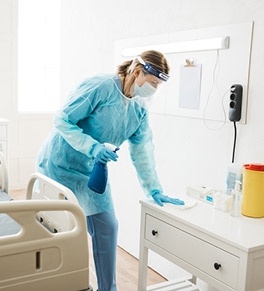Antibiotic-resistant superbugs: a looming health threat

Superbugs are everywhere — possibly even on you.
Superbugs are no ordinary germs.
They are pathogens that have evolved to resist most antibiotics. Not only is the number of people infected with superbugs increasing, many more types of germs are becoming resistant.
“Historically, superbugs have been bacteria but more recently highly resistant fungi have become problematic,” says Dr. Susan Huang, medical director of epidemiology and infection prevention for UCI Health.
Candida auris is one such emerging fungal superbug to present a serious global health threat. The concern prompted the Orange County Health Care Agency to issue an advisory last year asking hospitals to screen patients who are admitted from nursing homes.
A formidable microbe fighter
Huang has dedicated much of her career to fighting antimicrobial resistance.
Her groundbreaking clinical trial, published in the New England Journal of Medicine in 2013, demonstrated that a simple protocol known as decolonization could dramatically decrease antibiotic resistant infections in intensive care units (ICU).
Her subsequent clinical trials have shown that decolonization can also benefit high-risk patients outside of ICUs, including patients with medical devices and those in nursing homes.
Decolonization involves bathing patients with an antibacterial soap containing chlorhexidine, a potent antiseptic and disinfectant, and cleaning their nostrils with an antibiotic ointment to kill germs when they are first admitted to a hospital’s ICU.
Huang's decolonization protocol is now regarded as a best practice in ICUs to protect patients from a variety of microbes, particularly methicillin-resistant Staphylococcus aureus, known as MRSA. It also greatly reduced infections in the blood from all bacteria.
“Antibiotic-resistant pathogens are responsible for nearly 3 million infections in the U.S. every year," Huang cautions. "These infections are harder to treat and cause serious disease. Antibiotic resistant pathogens can also affect animals and vegetation, which in turn affect vital food crops and our meat industry. Without containment, there can be serious harm to each of these sectors which sustain human life.”
What is antimicrobial resistance?
Microbes become resistant to antibiotics for a variety of reasons:
- Pathogens adapt genetically through repeated exposure to antibiotics.
- Humans who take antibiotics and consume meat, produce or water containing antimicrobial agents also contribute to overexposure of antibiotics.
- Fewer new antibiotics are being developed as pathogens develop resistance to existing ones.
“There are eight billion people in the world, and each of us has trillions of microbes on our body. These bacteria and fungi can develop ways to evade antibiotics, especially when exposure to antibiotics drives their need to survive,” says Huang.
Unfortunately, the COVID-19 pandemic has had a detrimental effect on antimicrobial resistance. The U.S. Centers for Disease Control and Prevention released an urgent impact report in 2022 showcasing how years of gains in reducing antibiotic-resistant pathogens were entirely reversed during the pandemic because of the extensive use of antibiotics even though COVID-19 is a viral disease that does not respond to them.
Why it matters
Superbugs are everywhere — possibly even on you. They can be passed from one person to another, even among healthy people. These microbes often remain on the body for a long time.
Huang says this should concern people because:
- Superbug-caused infections are very difficult and sometimes impossible to treat.
- Patients who take antibiotics often or for a long time are at a higher risk for acquiring superbugs.
- Expensive, less effective second-line antibiotics are often used to treat superbug infections. They may take longer to work, must be given through an IV, have more side effects and require more monitoring.
How you can help
Taking antibiotics when they are not prescribed or needed is one reason antimicrobial resistance exists.
The unnecessary use of antibiotics during the COVID-19 pandemic exacerbated microbe resistance throughout the world. In general, most viruses have few or no treatment options and there was no effective treatment for COVID-19 during the first year of the pandemic, Huang says.
Steps you can take to prevent antibiotic resistance include:- Take antibiotics only when and exactly as prescribed.
- Complete the entire course of antibiotics prescribed, even if you feel better.
- Do not save antibiotics for use with a later infection.
- Do not share antibiotics.
- Practice good hygiene, such as washing your hands frequently with soap and water
Related Stories
Explore further
Browse more blog posts by topic.




